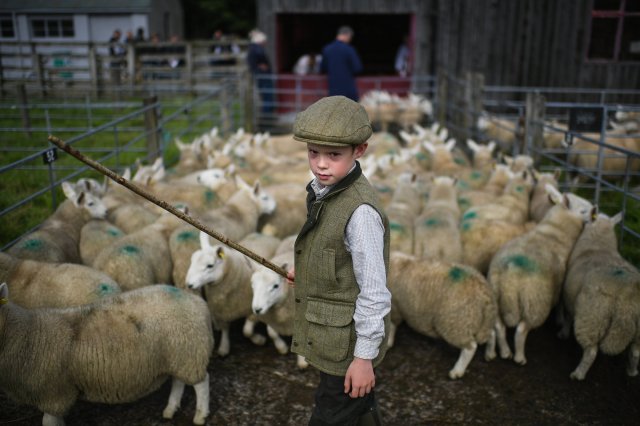Credit: Jeff J Mitchell/Getty Images

Picture the scene: a warm evening in Westminster, three days after the Chequers summit. Boris Johnson has just resigned from the cabinet. Tempers are running high. In a packed chamber, a Conservative MP gets to his feet, ready to respond to the oratory of his leftwing opponent. From his front row seat, a silent Michael Gove listens intently.
However, this is not the House of Commons, and the topic of debate is not Brexit – at least not directly. Rather our venue is the domed auditorium of the Emmanuel Centre and the occasion is an Intelligence Squared debate about, er, sheep. Not just any sheep, but the hardy breeds that wander across the British uplands – and whose constant grazing is what keeps our clouded hills looking the way they do i.e. barren and treeless.
The motion before the house is that “Britain should rewild its uplands” (you can listen to the debate here). Proposing it is the Guardian journalist, George Monbiot and the naturalist, Mark Cocker. Monbiot begins his impassioned plea with an observation, which is that, viewed from space, there’s something strange about Britain (and England especially). The anomaly is that, at higher elevations, British trees are thin on the ground. In fact, the densest tree cover in England is in the low-lying south-east of the country. This is opposite of what one would expect. Look at a map of the rest of Europe and you see that tree cover is associated with upland and other remote areas. For instance, you can see how trees mark out the great curve of the Carpathians or the mountainous spine of Italy. It is only where the highest ranges rise beyond the treeline that the uplands is bare.
No such excuse in Britain, where it is the ovine appetite for tender seedlings that stops trees from growing – not to mention the human appetite for farm subsidies. Though hardly a Brexiteer himself, Monbiot argues that Brexit provides a unique opportunity to rethink agriculture policy – and that payments provide incentives for the creation and conservation of habitats for wildlife, not their destruction.
Speaking for the other side is the President of the National Farmers Union, Minette Batters and Rory Stewart, the member of Parliament for Penrith and the Border (very much a hill farming area). Both emphasise that the overall level of subsidy is modest, amounting to not much more than £3 a year for every visitor to the UK’s upland beauty spots. Of course, the reason why the subsidies don’t amount to much is because upland agricultural output doesn’t amount to much. If upland farming ceased, UK food production would barely change.
However, what we would lose is a whole way of life (and there are still about 6,500 hill farmers across the country). Without their work, the landscape would indeed change, but not for the better – say their defenders. The open country and drystone walls of places like the Lake District and Yorkshire Dales would be swallowed up under “scrub”.
There then follows a somewhat confused argument over what exactly happens to land that isn’t farmed anymore; but actually the evidence is clear. With sufficient rainfall and enough time, it becomes woodland – the scrubby stage is intermediate.
As the Economist points out, the amount of woodland across the western world is growing, not shrinking, in almost every country:
“Because many of these forests are young, the quantity of wood in them is growing faster than their extent. Europe’s planted forests put on a little more than 1.1m cubic metres of wood per day. For comparison, the iron in the Eiffel Tower is about 930 cubic metres… Forests now occupy a third of America’s land, having grown by 2% in the past decade. They are even expanding in Australia, following a long decline.”
Though economic growth is often assumed to be bad for the environment, the fact is that the richest parts of the world are experiencing reforestation. There are many reasons for this, but the most important is abundance. We don’t have to force food out of poor land to feed ourselves anymore. So, mostly, we don’t:
“As the best farming areas have become more productive, and as rich countries have imported more of their food, marginal land has become unusable for ordinary agriculture. Some of the most dramatic forest growth in Europe has been in high, dry places where farmers once scratched a living from goats, sheep or olives. Forests now cover two-thirds of Catalonia, in Spain, up enormously from a century ago. In America, the fastest expansion over the past ten years has been in states such as Oklahoma and Texas, which have indifferent soils.”
The reason why farmers continue to seek out a living in upland Britain is because we, as taxpayers, pay them to do so – and even with the subsidies, incomes are pitifully low.
Surely, the time has come to face facts and incentivise change. A point rather lost in the debate is that the call is not to rewild the whole of uplands in one go. In a combined area that covers 4 million hectares (twice as much as all the built-up land in the country) there has to be room for experimentation.
We may find that fewer sheep and more wildlife has an enriching effect on both land and people. Certainly, we won’t know if we don’t try.










Join the discussion
Join like minded readers that support our journalism by becoming a paid subscriber
To join the discussion in the comments, become a paid subscriber.
Join like minded readers that support our journalism, read unlimited articles and enjoy other subscriber-only benefits.
Subscribe